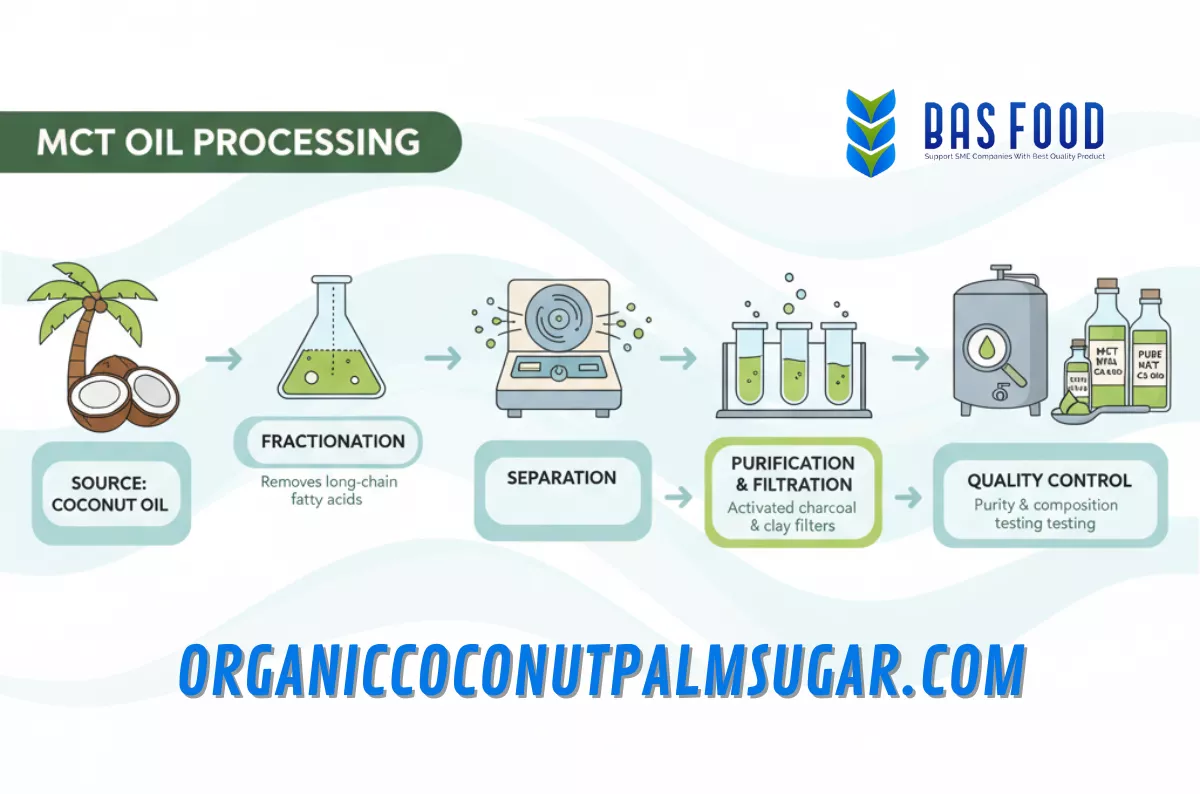When people talk about MCT oil, they’re referring to a concentrated form of medium chain fatty acids derived mainly from coconuts. In the world of nutrition, understanding the MCT oil science behind these fats is crucial. Unlike most dietary fats, which are long-chain triglycerides, MCTs are shorter in structure. That small structural difference gives them unique properties that make them easier to digest and faster to convert into energy.
Most commercial MCT oils contain four main types of fatty acids: caproic acid (C6), caprylic acid (C8), capric acid (C10), and lauric acid (C12). Among them, caprylic (C8) and capric (C10) are known for being the most efficient energy boosters. This is because they are quickly absorbed and converted into ketones.
In essence, MCT oil is a healthy fat source that’s rapidly digested and metabolized. It provides quick energy instead of being stored as fat. This is one reason it’s often promoted in ketogenic diets and performance nutrition.

The Chemistry of Medium Chain Fatty Acids
To really grasp the MCT oil science, it helps to understand what makes medium chain fatty acids so different from long-chain fats. Fatty acids are classified based on the number of carbon atoms in their structure. Medium chain fatty acids typically contain between six and twelve carbon atoms. In contrast, long-chain fats can contain up to twenty-four.
This difference changes everything. Medium chain fats are small enough to travel directly from the intestines to the liver via the portal vein. Long-chain fats, on the other hand, must first be packaged into chylomicrons and transported through the lymphatic system before entering circulation.
Because of this shortcut, MCTs bypass the slower digestion process. They act more like carbohydrates in terms of energy availability but retain the metabolic benefits of fat. That’s why MCT oil is often described as “fat that acts like a carb.”
How MCT Oil Is Metabolized: The Fast Energy Pathway
One of the most fascinating parts of MCT oil science is how it interacts with your metabolism. When you consume MCT oil, the body sends it directly to the liver. There, it undergoes a process called beta-oxidation, breaking down into smaller molecules called ketones.
Ketones are a clean and efficient metabolism booster. They provide instant energy to the brain, muscles, and other organs without spiking blood sugar levels. This is why MCT oil is often used by athletes, people on low-carb diets, or anyone seeking sustained energy without caffeine or sugar crashes.
Unlike long-chain fats that may be stored as body fat, MCTs are far more likely to be burned immediately for energy. Research has shown that replacing long-chain fats with MCTs in the diet can increase energy expenditure and support fat oxidation—making MCT oil a valuable tool in weight management.
The Role of Ketones: Why MCT Oil Supports Brain and Body
Ketones are the real stars of the MCT oil science story. When MCTs convert into ketones, they serve as an alternative fuel source to glucose. The brain, which usually depends on glucose for energy, can efficiently use ketones when glucose is limited.
This switch is what makes MCT oil popular among those following a ketogenic lifestyle. Studies suggest that ketones may enhance mental clarity, focus, and endurance by supplying a steady flow of energy to brain cells.
Additionally, ketones generate less oxidative stress compared to glucose. That means less inflammation and improved cellular efficiency. For people with neurological conditions or chronic fatigue, this metabolic shift can have notable benefits.
So, when someone says MCT oil sharpens their focus, it’s not placebo—it’s biochemistry in action.
MCT Oil as a Metabolism Booster: The Fat That Fuels Fat Burning
It might sound counterintuitive that eating fat can help burn fat, but that’s one of the central ideas behind MCT oil science. Because medium chain fats are metabolized differently, they increase thermogenesis. This process involves heat production in the body that burns calories.
Several studies have found that substituting long-chain fats with MCTs can enhance calorie burning by 5–10% over a 24-hour period. While that may sound small, it adds up over time. Especially when combined with a healthy diet and exercise.
Moreover, MCTs promote satiety. They help control appetite hormones like leptin and peptide YY, making you feel fuller for longer. This natural appetite suppression supports weight management without extreme dieting or hunger.
Simply put, MCT oil is not a miracle solution but a metabolism-friendly healthy fat source that encourages the body to use energy more efficiently.
The Science Behind MCT Oil and Gut Health
Another exciting part of MCT oil science is its effect on gut health. The antibacterial and antifungal properties of caprylic and lauric acids can help balance intestinal microflora. They do this by suppressing harmful bacteria such as Candida albicans and Clostridium difficile.
This helps create a more stable gut environment, improving nutrient absorption and digestive health. Some research also indicates that MCTs may help strengthen the gut lining, reducing inflammation and supporting the immune system.
Beyond digestion, these antimicrobial benefits can also indirectly boost metabolism and energy production. A healthy gut translates to better nutrient assimilation, hormone balance, and overall vitality.
Why MCT Oil Is a Healthy Fat Source for Modern Diets
Modern diets often overload the body with refined carbs and unhealthy fats. In contrast, MCT oil provides a clean, plant-based healthy fat source that’s easy to digest. It converts easily into energy. This makes it suitable for a wide range of people—from busy professionals to athletes and those following ketogenic, paleo, or vegan lifestyles.
Because it’s flavorless and heat-stable, MCT oil can be used in smoothies, salad dressings, or even for light cooking. Many people prefer taking it directly by the spoonful in the morning for an instant energy kick.
While moderation is key, adding MCT oil into daily meals can help balance fat intake and support a healthier metabolic profile. It’s not just about losing weight; it’s about fueling the body with smarter fats.
Comparing MCT Oil and Coconut Oil: Are They the Same?
People often confuse MCT oil with coconut oil, but they’re not identical. Coconut oil naturally contains about 55% MCTs, but it also includes other long-chain fats. MCT oil, on the other hand, is a purified extract that isolates the most beneficial medium chain triglycerides (usually C8 and C10).
That means MCT oil is more concentrated, faster to absorb, and delivers a stronger metabolic response compared to regular coconut oil. Coconut oil, however, still provides benefits through its lauric acid content, which supports immunity and skin health.
In short, think of coconut oil as the raw material and MCT oil as the refined, high-performance version. Both have their place, but if your goal is to improve energy or enhance metabolism, MCT oil delivers results more efficiently.
Applications of MCT Oil: From Fitness to Functional Foods
The applications of MCT oil science go beyond nutrition trends. MCT oil is now used in sports performance supplements, clinical nutrition formulas, and functional foods. Its fast-absorbing nature makes it ideal for patients with digestive issues or malabsorption disorders since it requires minimal enzymatic breakdown.
Athletes also benefit from MCT oil because it helps sustain endurance and delay fatigue during prolonged exercise. The stable energy from ketones can reduce dependence on carbohydrate refueling, promoting more efficient fat utilization.
In the food industry, MCT oil is being incorporated into energy bars, coffee creamers, and even infant formulas. Its neutral flavor and stability make it a versatile ingredient in health-focused product development.
Potential Side Effects and How to Use MCT Oil Safely
While MCT oil is generally considered safe, taking too much too soon can cause digestive discomfort. Symptoms like bloating, diarrhea, or cramping are common if you overconsume it at the beginning.
It’s best to start with 1 teaspoon per day and gradually increase to 1–2 tablespoons as your body adjusts. Always take it with food to minimize stomach upset. People with liver conditions should consult a healthcare professional before regular use, as MCTs are primarily metabolized in the liver.
Quality also matters. Choosing a pure, sustainably sourced MCT oil from trusted coconut suppliers ensures maximum benefit and minimal impurities.
Why Indonesia Is Becoming a Key MCT Oil Supplier
Indonesia, one of the world’s largest coconut producers, plays a crucial role in the global MCT oil market. With abundant coconut plantations and improving processing facilities, the country supplies high-quality raw materials for MCT oil production.
The increasing demand for sustainable and plant-based oils has made Indonesian coconut suppliers stand out. They are noted for their consistency, purity, and ethical sourcing practices.
One of the notable players in this field is CV Bonafide Anugerah Sentosa. It is a trusted spices supplier and coconut supplier from Indonesia. The company provides premium coconut derivatives such as MCT oil, coconut water concentrate, and coconut milk cream. Additionally, they supply spices like cloves, nutmeg, and vanilla beans for global export.
Their products are sourced responsibly and processed to meet international quality standards, supporting Indonesia’s reputation as a reliable origin for natural, high-value commodities.
The Future of MCT Oil Science
The science around MCT oil continues to evolve. Researchers are exploring its potential benefits in metabolic disorders, Alzheimer’s disease, and endurance sports. Preliminary studies suggest that MCT oil might improve insulin sensitivity, enhance cognitive function, and even support healthy aging by protecting mitochondria from oxidative stress.
With growing interest in clean energy nutrition and plant-based diets, MCT oil is expected to remain a staple in the healthy fat source category. As more evidence emerges, it’s likely to expand into medical and performance nutrition applications globally.
Final Thoughts: MCT Oil as Smart Nutrition for Modern Living
MCT oil isn’t just a fad—it’s backed by real science. From its rapid absorption to its role as a metabolism booster, this unique fat bridges the gap between fuel and function. It’s a rare example of how understanding chemistry can lead to smarter eating habits and better energy management.
For anyone looking to optimize health naturally, MCT oil represents an easy yet powerful addition to the diet. And with trusted suppliers like CV Bonafide Anugerah Sentosa ensuring sustainable coconut sourcing from Indonesia, it’s now easier than ever to bring science-backed nutrition into everyday life.
Contact CV Bonafide Anugerah Sentosa how we can provide the best solutions for you. WhatsApp: +62 8213 4505 737, Email: info@bonafideanugerahsentosa.com / bas.mdir@gmail.com.

